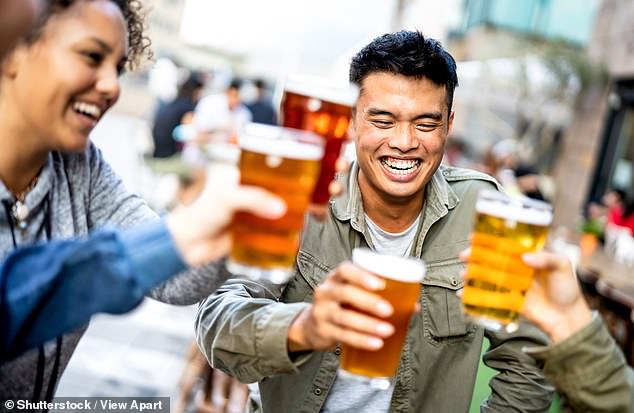Why ‘hangxiety’ is forcing Gen Z to ditch the booze as experts claim young people experience heightened feelings of stress and anxiety after heavy drinking
- As many as one in five Britons aged 18 to 24 are now teetotal and drink less often
- In stark contrast, only 13 percent of over-25s said they were teetotal
Young people are ditching alcohol and embracing sobriety due to fears of social media-induced “hangxiety” – a combination of “hangover” and “anxiety.”
Experts claim that feelings of stress and anxiety after heavy drinking are exacerbated in Generation Z, who face the added fear of their drunkenness being plastered across TikTok, Snapchat and Instagram.
This could explain why as many as one in five Brits aged 18 to 24 are now teetotal and less likely to drink than any other generation.
The sober trend is growing, with 21 percent of under-25s saying they didn’t drink last year – up from 14 percent in 2017, according to the latest annual survey in Britain by the charity Drinkaware.
In stark contrast, only 13 percent of over-25s said they were teetotal.
As many as one in five Britons aged 18 to 24 are teetotalers and drink less often than any other generation

In stark contrast, only 13 percent of over-25s said they were teetotal
Justine Roberts, founder and CEO of online parenting forum Mumsnet, says she sees a lot of discussion between parents who say their children drink less than they do.
Speaking on BBC Radio 4’s Today program yesterday, she said: ‘We must remember that this generation has grown up in the world of social media, and if you fool yourself, as we probably all have with excessive alcohol consumption, there is a possibility that this will come out and go viral.
“We didn’t have that, we just had friends and acquaintances around who saw us being crazy.”
The mother-of-four added: “I think this generation, for all kinds of reasons, is a little more health-conscious, a little more self-conscious, and maybe also has more to do than just hang out at the bar.”
The feeling of ‘hangxious’ after drinking appears to be most common among young drinkers, with two in five under 34-year-olds regularly experiencing ‘hangxiety’, compared to a tenth of those aged 35 and over, according to research from the charity Alcohol Change UK.
Of young people aged 18 to 34, more than a third said this was a factor contributing to their decision to drink less.
Because alcohol is a depressant, feelings of stress and guilt can increase once its relaxing effects fade. Plus, it can lower inhibitions, making drinkers more likely to do things they regret.
Dr. David McLaughlan, a consultant psychiatrist and addiction specialist at independent mental health provider Priory, said drink affects serotonin, a neurotransmitter that regulates mood. bad mood, depression and ‘hangxiety’.’
